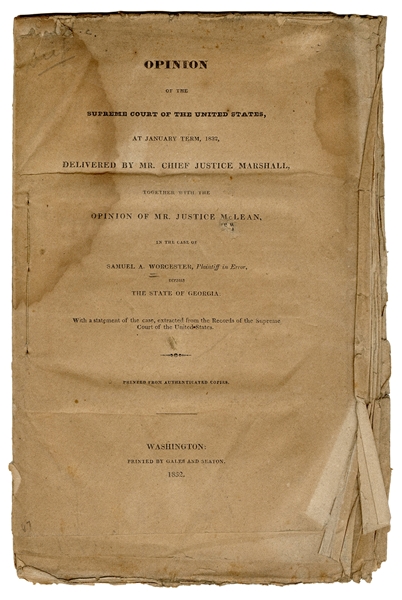MARSHALL, John (1755-1835), Chief Justice of the Supreme Court . Autograph memorandum signed ("J Marshall"), n.p., n.d. 1½ pages, 4to, light browning, small loss on left edge affecting two letters of text. MARSHALL'S LEGAL OPINION ON AN ESTATE CASE. The eminent Virginia jurist Marshall offers an interpretation of an estate case involving a second marriage. Marshall begins by examining the facts of the case, in which a W. Edwards, deceased, leaves money to his children by his second wife, Lucy Pemberton. Marshall states, "I am further informed that the money mentioned in the will was paid to Lucy Pemberton then Lucy Edwards as the Guardian of her infant children." In light of the father's death, the children of Edwards's first marriage apparently demanded a portion of the estate. Marshall states, "I consider the question concerning the validity of the payment as being too doubtful for the ex[ecutor] to hazard the distribution of the residuary estate on the opinion of any lawyer," so he suggests that "a case ought to be laid before the Chancellor by a friendly suit... by the children of the second marriage against the ex[ecutor] of the children of the first." Marshall, who served as chief justice from 1801-1835, wrote the decision in Marbury v. Madison , the first case to test the Supreme Court's ability to determine the constitutionality of a law. A contemporary wrote that he had an "original, and almost, supernatural faculty ... of developing a subject by a single glance of his mind" ( DAB ).
MARSHALL, John (1755-1835), Chief Justice of the Supreme Court . Autograph memorandum signed ("J Marshall"), n.p., n.d. 1½ pages, 4to, light browning, small loss on left edge affecting two letters of text. MARSHALL'S LEGAL OPINION ON AN ESTATE CASE. The eminent Virginia jurist Marshall offers an interpretation of an estate case involving a second marriage. Marshall begins by examining the facts of the case, in which a W. Edwards, deceased, leaves money to his children by his second wife, Lucy Pemberton. Marshall states, "I am further informed that the money mentioned in the will was paid to Lucy Pemberton then Lucy Edwards as the Guardian of her infant children." In light of the father's death, the children of Edwards's first marriage apparently demanded a portion of the estate. Marshall states, "I consider the question concerning the validity of the payment as being too doubtful for the ex[ecutor] to hazard the distribution of the residuary estate on the opinion of any lawyer," so he suggests that "a case ought to be laid before the Chancellor by a friendly suit... by the children of the second marriage against the ex[ecutor] of the children of the first." Marshall, who served as chief justice from 1801-1835, wrote the decision in Marbury v. Madison , the first case to test the Supreme Court's ability to determine the constitutionality of a law. A contemporary wrote that he had an "original, and almost, supernatural faculty ... of developing a subject by a single glance of his mind" ( DAB ).















Testen Sie LotSearch und seine Premium-Features 7 Tage - ohne Kosten!
Lassen Sie sich automatisch über neue Objekte in kommenden Auktionen benachrichtigen.
Suchauftrag anlegen